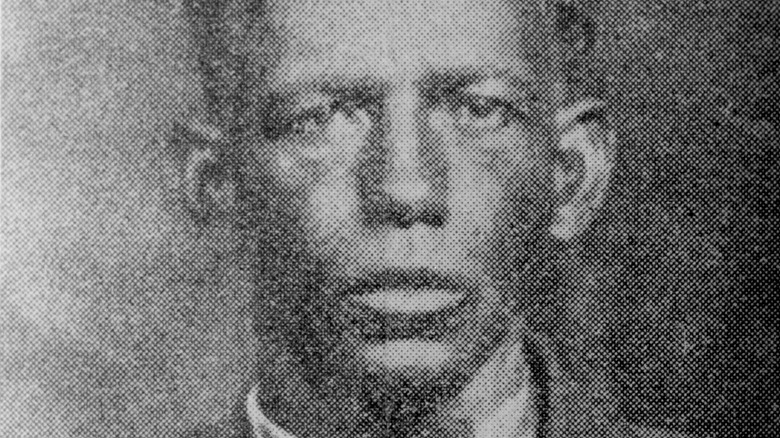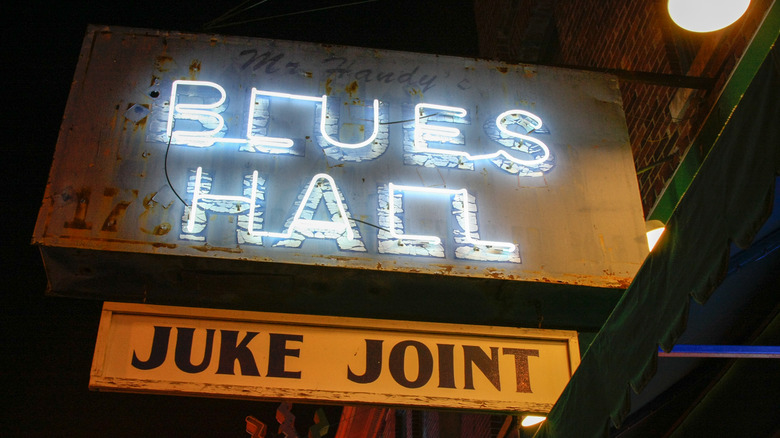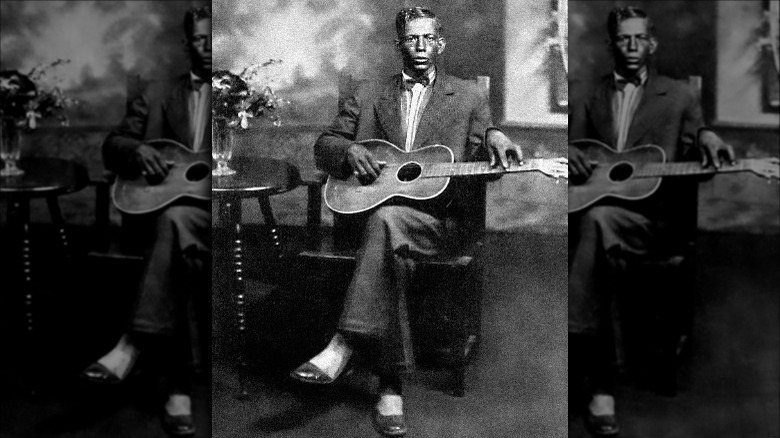The Untold Truth Of Charley Patton
The Rock and Roll Hall of Fame announced its 2021 class of inductees in early May. The performers who will be inducted in October are Tina Turner, Carole King, The Go-Go's, Jay-Z, Foo Fighters, and Todd Rundgren. But they aren't the only musicians to be honored at the ceremony. There are other categories of awards, as well, including the Early Influence Award, which, as the name indicates, pays homage to a progenitor of a certain musical style. This year's influencers include electronic pioneers Kraftwerk, the jazz fusion poet Gil Scott-Heron, and early Delta bluesman Charley Patton.
The Rock Hall is actually a bit late to honor Patton. As any fan of the blues will tell you, rock and roll — and thus, it's Hall of Fame — wouldn't exist without him. The roots of American popular music — from rock and roll to heavy metal to hip-hop — go back to the blues. Patton was one of the first blues musicians to record the songs he sang as he traveled across the American South, sowing the seeds of what would be several genres that captivated the world's attention. Let's take a look back into Patton's rowdy life and see how he influenced decades of American music to come.
Charley Patton was the archetypical Delta bluesman
The bluesman in our popular imagination is a hard-drinking, womanizing, eccentric performer, an itinerant musician who lives off what little he can earn plucking his six-string for farm laborers looking to shake away the blues of the work week in a sweaty juke joint. And we get this image from Charley Patton. Guitarist Jack White told NPR in 2015 that he considers Patton one of the "granddaddies of modern music," along with other seminal pluckers like Son House, Skip James, Blind Lemon Jefferson, and Robert Johnson. White called Patton "the most important figure" in the early days of blues recordings, saying that "he's the one that all the other blues musicians looked up to. He's almost the beginning of the family tree."
In his landmark 1982 book "Deep Blues," musicologist Robert Palmer meticulously documented Patton's influence on the early Delta blues. He cited another influential bluesman, Howlin' Wolf, who said, "It was [Patton] who started me off playing."
Patton was definitely an innovator of blues guitar and songwriting, but he was also a charismatic and energetic performer who drew excited crowds wherever he went. He beat rhythms out on his guitar, played it between his legs, and threw his loud, gravelly voice to the back of the juke joints in order to be heard over the whooping of dancers. According to Mississippi Blues Trail, some plantation owners kicked him off their land because he distracted people from their work in the fields.
Patton 'married' eight times
Charley Patton was also an inveterate womanizer. He liked to dress up in flashy suits, drink whiskey, and find girlfriends wherever he went. According to The Blues Trail, he married eight different women during the short time he spent traveling the South playing the blues. Some of those marriages were common law, but he married several women legally, as well.
Unsurprisingly, Patton was not an easy man to be married to. He was constantly on the road, an alcoholic, and had a temper that he failed to control. As Palmer noted in "Deep Blues," he and one of his wives, Bertha Lee, were thrown in jail in Belzoni, Mississippi, in 1934 after a particularly violent marital row. And Patton wasn't very good at hiding his philandering. A singer herself, Bertha Lee recorded a song called "Mind Reader Blues," the lyrics of which tell how she didn't need extrasensory perception to see what he was up to: "I took a long look right smack down in your mind/ And I see more women, all up and down the line." Patton would end up paying a pretty dire price for his womanizing toward the end of his life.
Patton sang about the 1927 flood and hid protests in his lyrics
The blues is a genre of music that takes personal experience, often difficult or tragic personal experience, and comments on it so that the singer and listener find a way to turn it into something, if not joyful, at least bearable. One such experience in Patton's day was the flooding of the Mississippi River in 1927, one of the biggest disasters in American history. Patton wrote his famous song "High Water Everywhere" about this devastating natural disaster. However, as musicologist David Evans told NPR in 2005, the song also contemplates social issues associated with the event. He said that while white families were able to evacuate as the waters rose, Black families were ordered to stay in flooding areas and forced to work on the levees. He equated the situation to residents of New Orleans being forced to stay in the Superdome rather than escape their flooded city after Hurricane Katrina in August 2005.
So while Patton — a light-skinned man whose exact ancestry is unknown, but who was definitely not considered white — ostensibly wrote "High Water Everywhere" about the 1927 flood, Evans noted that he also snuck in social commentary on the sly. "I would go to the hill country but they got me barred," Patton sang, bringing some attention to how he and other Black people were treated during the disaster. In other songs, however, Patton was a bit more overt with his social criticism. "Every day seem like murder here," he sang about the South in "Down the Dirt Road Blues."
Charley Patton had his throat cut in a fight, but he kept on singing
Patton's hard-drinking lifestyle inevitably led to violence and conflict. And one such conflict, while nearly cutting his already short life even shorter, added to his mystique as a badass blues singer. Palmer recounts in "Deep Blues" how Patton had his throat slit a couple years before his death. It is unclear as to exactly who attacked him. Some reports lay the blame on his last wife Bertha Lee, who obviously was not okay with his womanizing ways. It's possible that she was after some revenge, but unlikely, as she stayed with him until his death. According to a niece of Patton's, the culprit was a jealous man, most likely the husband of a woman Patton had gone to bed with.
Patton survived the attempt on his life, but it did leave a gnarly scar across his neck from ear to ear. He even kept singing, his voice even more gravelly than before, and recorded several songs after he healed. However, as the addicted tend to be, he was his own worst enemy. He survived the throat slitting, but his body was breaking down after he'd treated it like an ashtray for so long. The years of drinking, chain smoking, and partying were taking their toll. Patton died of heart failure in 1934. Although his exact birth year is unknown, the most agreed-upon year is 1891. Patton was just in his 40s at the time his blues-stricken heart finally gave out on him.
His influence on subsequent musicians extends to the present
Although his legacy is largely unknown to those who are not die-hard fans of the blues, Patton's influence on subsequent musicians cannot be understated. In addition to the inimitable Howlin' Wolf, Patton also influenced another contemporary of his named Robert Johnson, who, it was rumored, had sold his soul to the devil at a crossroads in Mississippi. While definitely an innovator and progenitor of the blues in his own right, Johnson actually learned some of his licks from Patton. Palmer's "Deep Blues" recounts how Patton was a significant early influence on Robert Johnson's playing style. Johnson saw Patton as a type of mentor and used that influence to create his own style of greatness on the blues guitar.
Patton continues to influence artists to this day, as Jack White (pictured above) can attest to. Anyone who has played the blues since obviously owes a debt of gratitude to Patton. But the blues were the fertile artistic soil out of which nearly all American popular music grew, so we have everything from rock and roll to funk to hip-hop and even electronica thanks to Patton. The hard partying bluesman is the paterfamilias of almost every sound to come after he burned out hard and bright, and it's about time the Rock Hall celebrated his legacy.





